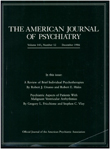Geriatric emergencies: psychiatric or medical?
Abstract
To determine how the elderly use the emergency room, the authors compared emergency patients 65 years old and older with younger patients in terms of demographics, clinical factors, patterns of emergency room use, and clinicians' responses. They found that, like younger patients, the elderly had scanty social supports but, unlike younger patients, came for care repeatedly with somatic complaints. Despite coexisting medical and psychiatric illnesses, these patients were generally managed by one service without consultation from the other. The authors, who found no differences in physicians' attitudes toward younger and older patients, emphasize the need for a holistic, psychobiologic approach to the care of the elderly emergency patient.
Access content
To read the fulltext, please use one of the options below to sign in or purchase access.- Personal login
- Institutional Login
- Sign in via OpenAthens
- Register for access
-
Please login/register if you wish to pair your device and check access availability.
Not a subscriber?
PsychiatryOnline subscription options offer access to the DSM-5 library, books, journals, CME, and patient resources. This all-in-one virtual library provides psychiatrists and mental health professionals with key resources for diagnosis, treatment, research, and professional development.
Need more help? PsychiatryOnline Customer Service may be reached by emailing [email protected] or by calling 800-368-5777 (in the U.S.) or 703-907-7322 (outside the U.S.).



